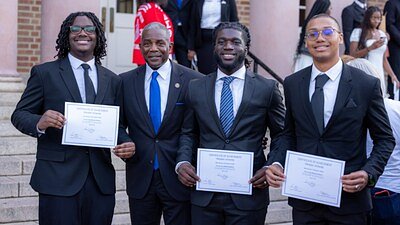
Hampton University Defies Trends with Record Enrollment Surge
Amidst national declines, Hampton University sees a 46% enrollment jump, fueled by data-driven strategies, a focus on belonging, and a commitment to workforce development. A model for higher education resilience.
Hampton University Defies Trends with Record Enrollment Surge
HAMPTON, VA – November 20, 2025 – In an era where many colleges and universities grapple with declining enrollment, Hampton University is charting a strikingly different course. The historically Black university (HBCU) has announced a remarkable 46% surge in overall enrollment, reaching over 4,600 students – a decade high. This growth isn’t merely a statistical anomaly; it’s a testament to a carefully constructed strategy centered on data-driven decision-making, a deep commitment to fostering a sense of belonging, and a proactive approach to workforce development.
A Counter-Trend in Higher Education
The national landscape for higher education is often painted with shades of concern. Years of rising tuition costs, shifting demographics, and a re-evaluation of the value proposition of a four-year degree have contributed to stagnant or declining enrollment at many institutions. However, Hampton University’s recent success bucks this trend, demonstrating that a focused, student-centric approach can yield significant results. The university’s growth of 44% over the last three years is particularly notable, showcasing sustained momentum. “We’re seeing a renewed interest in the value and community that HBCUs provide,” a university administrator noted. “Students are seeking environments where they feel supported, seen, and empowered to succeed.”
The ‘Belonging by Design’ Framework
At the heart of Hampton’s success lies its “Belonging by Design” framework. This isn’t simply a slogan; it’s a deeply ingrained philosophy that permeates every aspect of the student experience. Recognizing that a sense of belonging is crucial for student retention and academic success, the university has intentionally integrated community-building initiatives into the curriculum, mentorship programs, and campus life. “We’ve redefined retention as a measure of belonging,” explains a university leader involved in the initiative. “We’re not just trying to keep students enrolled; we’re striving to create an environment where they feel truly connected and supported.” Climate surveys conducted between 2022 and 2024 reveal a demonstrable increase in students' reported feelings of academic support, faculty accessibility, and overall campus connectedness – a direct result of these intentional efforts.
Data-Driven Decision Making and Strategic Investment
While the “Belonging by Design” framework provides the emotional core of Hampton’s strategy, data analytics provides the navigational compass. The university has invested heavily in data collection and analysis to understand student needs, identify areas for improvement, and measure the effectiveness of its programs. This data-driven approach has informed strategic investments in academic programs, campus infrastructure, and student support services. Hampton University’s recent achievement of the Carnegie R2 Classification for high research activity underscores this commitment to data and academic rigor. The R2 designation, achieved in 2024, places Hampton among an elite group of institutions nationally and enhances its ability to attract competitive research funding and top-tier faculty. As one academic noted, “The university now has the capacity to expand the breadth and depth of its research, which not only enhances our reputation but also provides our students with unparalleled research opportunities.”
Bridging the Skills Gap and Serving the Community
Hampton University’s commitment extends beyond the campus gates. Recognizing the importance of connecting higher education with workforce needs, the university launched a robust Workforce Development Initiative. This initiative focuses on providing vocational training, industry-aligned certifications, and entrepreneurial development opportunities. With a $2.2 million investment, and boosted by a $2 million federal grant, the Workforce Development Enterprise (WDE) established dedicated centers for community health, culinary arts, and innovation. “We see ourselves as an anchor institution, responsible for not only educating students but also contributing to the economic vitality of the region,” a university administrator explained. The initiative addresses critical skill gaps in fields like healthcare, culinary arts, and advanced manufacturing, equipping local residents with the skills they need to succeed in the 21st-century economy. The WDE also fosters partnerships with local businesses, ensuring that training programs are aligned with industry needs and that graduates have access to meaningful employment opportunities. This commitment to community engagement further strengthens Hampton’s position as a vital economic engine in the Hampton Roads region.
Hampton University’s success serves as a compelling case study for institutions grappling with the challenges of the modern higher education landscape. By prioritizing student belonging, embracing data-driven decision-making, and actively engaging with the community, Hampton has not only defied the odds but has also established itself as a model for resilience and innovation.
